» Alfred Hitchcock is considered a master filmmaker by master filmmakers.
Update - 02 Aug 2012 » What a coincidence! Looks like Alfred is now the Director of #1, most highly critically-acclaimed, top-rated film .. of all time. In any language. (Ever!)
Bumping off Citizen Kane, directed by Orson Wells in 1941 (.. the same year that Bob Dylan and Dick Cheney were born) ..
.. a movie which had held the highly-coveted TOP slot since 1962 (.. the year when the list was conceived).
In other words, Citizen Kane has set atop the Filmmaking world for 50 years. That's a long time.
Vertigo, the new throne-sitter, was released in 1958 (.. also before the year the list began).
Filmmaking is arguably the most creative art form .. able to transport us, quite effectively, as you know, to distant worlds .. of both reality & imagination.
While a novel [ Writing ] can convey far more narrative DETAIL and nuance, Filmmaking is certainly the most sophisticated art form .. employing a remarkable number of different crafts, witnessed every time the credits roll at the end.
Today's development can only make the remainder of this New Year's eve entry seem even more timely. Gives it an almost prophetic flavor .. cinematically speaking ..
.. especially when you consider HOW the term 'Vertigo' is defined. (Think fiscally.)
Funny how the Wikipedia entry, which has nothing to do with Hitchcock, (near the end of the second paragraph) talks about the "notorious symptoms of vertigo". You'll see what I mean shortly. </update>
 The meticulous storyboard planning Alfred invested in each shot is famous for yielding a remarkable economy of narrative.
The meticulous storyboard planning Alfred invested in each shot is famous for yielding a remarkable economy of narrative.
[ An effect I admire, cuz I constantly strive for economy-of-narrative myself, artistically as possible, in writing.
Writing for the Web is very much about economy (.. as is programming). Saying much with few words.
Tho unlike Alfred, I dont plan very much. Only today, for example, did I get the idea for today's entry. Trying to keep it organic. ]
Regulars might recall how, back when I was dating Wendy, the Film school student, I accompanied her to many graduate classes at USC (.. perhaps the world's finest Film school).
While I was there, Drew Casper held the Hitchcock chair. I sat in on some of his Hitchcock classes. High energy. Entertainingly confrontational. Big auditorium. Lots of students. I was impressed that he seemed to know all their names .. so early in the semester.
Drew was certainly stimulating, but none could match the cool-oozing Todd Boyd .. specially when he made his entrance strutting on stage to some hip, groovin' music ..
.. wearing a plush fur-coat and a gangster fedora .. pulled down low over his eyes. See this photo for a better idea. (I see him on TV every once in a while .. discussing cinema.)
He was teaching a course on culture and style in cinema .. so what better way to begin the class?
He was also at a Valentine's Day party I attended .. up in LA .. at the home of another Cinema professor (.. tho I forget her name .. the lady that helped Wendy get into the undergrad Cinema program there at USC. She seemed very young to me.).
Todd came late (.. to the party) .. but you can't miss him .. with that fur coat and hat. He pretty much takes up an entire room to himself. Professor Barry White. =)
I remember how stoked Wendy was the day she came home and told me how she'd MET Hitchcock's daughter (.. now in her 80's) who had visited Drew's class and presented all of his students with a wrist watch.
She was so excited. You might've thought she'd touched the hem of the garment of the master himself. (Nice watch, too. Not a cheapie.)
Anyway, one of Hitchcock's most famous scenes came during the filming of » Notorious. An excerpt from the Wikipedia entry (3rd paragraph) reads:
"The film is known for two scenes in particular. In one of his most famous shots, Hitchcock starts high and wide on a second floor balcony overlooking the great hall of a grand mansion.
Slowly he tracks down and in on Ingrid Bergman, finally ending with a tight close-up of a KEY tucked in her hand. So arresting is the shot that an outline of the KEY became a graphic element in the film's promotional material."
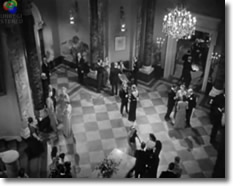 Key word » arresting. The scene is posted » here (40 secs). You neednt be a film critic to understand this KEY will play a crucial part in the story.
Key word » arresting. The scene is posted » here (40 secs). You neednt be a film critic to understand this KEY will play a crucial part in the story.
» A Week of Holiday Pause
We'll return to Hitchcock and his famous shot later, but first, let's shift gears and let me wish you a happy & prosperous New Year.
The week between Christmas & New Years always feels like the world is on pause.
My favorite way to spend the holiday week is at » Two Bunch Palms .. relaxing, reading, soaking & sunning.
If you go, say Hi to Rick the waiter for me. He has the best stories! (Ask him about Anna Nicole.) Those are Rick's arms you see in The Player .. when he says, "Right away, Mr. B." =)
Have you noticed however, how much faster the other 51 weeks seem to be moving .. since the quantum leap in Connectivity (.. the advent of Web + Cellular)?
Next stop » 2012. That's right, dawg .. the year about which more modern movies have been made.
While it's fun to joke about 2012 as being the long-prophesied Apocalyptic year .. I suspect there's a hint of nervous laughter behind much of that kidding.
It's not like we need Hollywood or some ancient calendar to make us feel as tho the world is starting to come apart .. or like the wheels are starting to come off.
Cuz things do feel wobbly out there. And not just here in the States either, but the world over. Lots of new words are take-offs of 'Armageddon.'
I mean, if you were hired to write an article on the End of the World, with the sole condition that it absolutely must be plausible and believable .. you wouldnt have to work very hard .. or need very much imagination.
» Expect the Unexpected in 2012
No, I dont expect to see a tsunami come crashing over the mountains, but I will be keeping out a wary eye for the unexpected. Those who have expected the unexpected, specially these last few years, have not been disappointed.
So even without the Mayan calendar or the Hollywood dramatization there's an underlying sense of unease and apprehension about the coming new year.
Certainly a major source of this anxiety comes from » the economy. Europe seems to have some new crisis every other week while we here in the States are still trying to recover from the economic meltdown of 2008.
Many pundits claim that nothing structural has really changed, except that Too-Big-to-Fail banks are now even bigger and our national debt is exploding.
The housing market would dry up and blow away without government support. Meanwhile, Fannie & Freddie, now in government conservatorship, continue to require injections of billions of taxpayer $dollars on a predictably. Regular. Basis.
And every time the Fed tries to wean the economy off its regular doses of financial steroids, the markets start to tank.
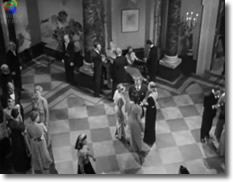 » Researching Economic Theory
» Researching Economic Theory
I am no Economist. Tho I did have an Economics class in college (Macro).
But our nation's economic trajectory is so depressing that I tend to avoid the subject.
(Like most Americans, I already have plenty of distressing stuff to deal with.)
// Begin collegiate coincidence sidebar.
By pure chance (coincidence) I happened to take both Economics & Sociology during the same semester .. the only two courses I took that semester (.. while working full time).
And I learned that » the Economic system controls & defines the Social system. (« That last sentence is worth re-reading.) Communism, for example, is both an economic and a social system. Same goes for Capitalism.
The two are linked (politically) .. the economic and social systems .. in ways that were not readily apparent when I signed up for the classes. You cant separate one from the other. (Nor can you separate questions of Fairness & Justice from the subject of Society.)
Here in America, MONEY (capital), more than any other thing, defines our Social status, our class. You are your bank account, your net worth. It may not be very pretty, but everybody seems to accept it.
The more wealth a person possesses, the more highly our society esteems him. The fabulously rich are revered, almost worshipped. Rich crooks are esteemed more highly than poor saints. Quite a bit more.
This inherent, systemic exaltation of money as the principle thing in our Capitalistic culture speaks volumes about the values promoted by our society .. by our very culture .. implicitly suggesting that money is even more important than than things such as right & truth & honor.
And even more important than KIDS. But that's a discussion we'll save for another day.
The ends always justify the means. (Or maybe it just appears that way.)
Capitalism could just as easily be called Moneyism .. were that moniker not so obviously unflattering. "In God We Trust" .. we who?
In Societies where Capital is king, if you have nothing, you're a nobody.
Have you noticed how our culture has become more about "doing more with less" .. than it is about the Doer doing the doing?
It was also in this Economics class that our prof enthusiastically proclaimed (on numerous occasions and with a loud voice) » "Alan Greenspan is the most powerful man in America!" [ .. back when Alan was the groovy chairman of the Federal Reserve ].
It may seem obvious to you .. but it actually came as a revelation to me .. that the reason the SY$TEM is about the money .. is because » the people who RUN IT .. are about the money. Think about it.
I call 'bullshit' on the bullshit.
When you consider how the EU is primarily an Economic union, you can see how many different nations have voluntarily entered into a solemn, binding, and surprisingly dictatorial agreement (.. a 'covenant' of sorts) based primarily, and almost exclusively, upon » money.
Which reminds me of something Paul wrote to Timothy, where he called "corrupt" people who » "suppose that gain [$] is godliness" .. cuz that would probably include many of the Americans you know.
Anyway, this was all major food for thought while driving home from class each night (.. after first stopping by In-n-Out, a bastion of fast-food known for its delicious Capitalist burgers).
And yes, it would've been nice, very nice, if my folks could've paid my way thru college, like many of my friends' parents did for them. Or at least chipped in a little.
Then maybe I wouldnt've had to work my way thru college, and it wouldnt have taken me 10 years to complete a 4-year degree (BSc) .. by taking a course here and a course there. But hey, things dont always work out the way we would like. And friends say I'm a better man for it.
// End collegiate coincidence sidebar.
Nevertheless, on the eve of 2012, and in the shadow of its looming implications, I've done a little research .. to try-n-bring myself up to speed .. to attempt to wrap my head around the problems that our economy faces.
I'm talking » big picture stuff. Ballpark perspective. Tho it's funny, cuz it's precisely this ballpark perspective that has allowed me to to focus on [ pinpoint ] what I feel is the heart of the matter .. the crux of the issue.
 » Keynes vs Hayek
» Keynes vs Hayek
I discovered that you dont get very far into Economic Theory without encountering the names of two prominent Economists » Keynes (British, 1883 - 1946) and Hayek (Austrian, 1899 - 1992).
There's actually an entertaining rap video (10 mins) that compares and contrasts their differing views/theories on the best ways to implement governmental policies in order to foster economic growth.
Break out the headphones. Plug 'em in and turn it up.
Even better tho, are the three videos (by Lawrence White) that EXPOUND on the Hayek side of the rap video:
- Part I » Fear the Boom (7 mins)
- Part 2 » The Bust (7 mins)
- Part 3 » Cluster of Errors (5 mins)
[ That's right, dawg. Everything I know about Economics I learned from a rap video. =) ]
Keynes' most popular book is » The General Theory Of Employment Interest And Money (1936). Hayek's most popular book » The Road to Serfdom (1944) .. which is still selling like crazy. (« If you think about it, that's an encouraging sign.)
There's even a simplified cartoon version of the Road to Serfdom posted » here (5-min YouTube video).
.••• today's entry continues here below •••
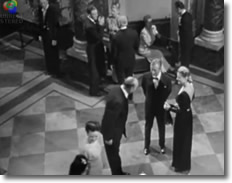 Videos that discuss Keynesian economic theory are posted here:
Videos that discuss Keynesian economic theory are posted here:
- Part 1 » It's All About Spending (15 mins, very good)
- Part 2 » I was unable to find Part 2, titled 'Keynesian Recovery' mentioned at the end of Part 1
A good book was released just last year on this very subject, titled » Keynes Hayek: The Clash that Defined Modern Economics. (I am currently #8 on the wait-list at our local library.)
So altho these guys have both long been dead, the debate framed by their theories remains contemporary and seems more relevant today than ever.
One of Keynes' most outstanding prophecies was predicting the rise of Nazi Germany, following the Treaty of Versailles, which followed WWI (.. the "War to End All Wars") ..
.. which Keynes bitterly criticized (the treaty) after he resigned from the multi-national team responsible for drafting the document, because it forced Germany to pay more war reparations than humanly possible.
Keynes is famous for saying » "Vengeance, I dare predict, will not limp". (And it didnt.)
TIME magazine named Keynes to its list of the 100 Most Important Persons of the Century, saying, "His radical idea that governments should spend money they don't have may have saved capitalism."
Say what?! I had to read that again. Saved capitalism? You mean, there was a time when it looked like Capitalism itself might .. fail? die? lose?
 » Commanding Heights | Who Controls the Economy?
» Commanding Heights | Who Controls the Economy?
Yes, there was. You can learn all about it by watching the online videos posted at » Commanding Heights, subtitled » The Battle for the World Economy.
Videos posted here:
- Episode 1 - Battle of Ideas (19 videos)
- Episode 2 - The Agony of Reform (21 videos)
- Episode 3 - New Rules of the Game (23 videos)
The aesthetic quality of these online videos is fair to middling. Each individual video lasts only 3 to 8 minutes, so you need to keep reloading the next page. Clearly the folks at PBS are coaxing the viewer to purchase the 3-DVD set (.. which sells for US$21).
The term/phrase 'Commanding Heights' was coined by Lenin in 1922, some 5 years after the October Revolution. [ See the video posted » here, titled Communism on the Heights at t=3:10. ]
I watched the online version. The audio has been over-encoded, (.. which is hard to do with dialogue that contains no music) but the content is still eye-opening. Remarkable. Insightful. Entertaining. Easy to recommend.
The Commanding Heights program also begins with Keynes and Hayek. This production excels at cutting thru Gross Domestic Jargon and presenting complex economic and political ideas in language that is simple and easy to understand.
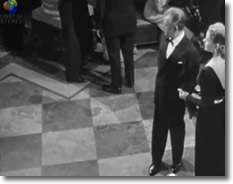 » Central Planning vs Market Forces
» Central Planning vs Market Forces
In a nutshell, Keynes says GOVERNMENTS should control the economy and use "central planning" to smooth out fluctuations in the business cycle.
Keynes theories were formulated in the depths of the Great Depression, which was viewed as one such 'fluctuation'.
[ Note that Communism is/was a centrally-planned economic system. ]
Whereas Hayek (who won the Nobel Prize in '74, some 30 years after Keynes died) says that Keynes' approach breeds Corruption and Cronyism, and that the economy should rather be controlled by MARKET FORCES.
It may not be intuitively obvious, but note that MANY people help control market forces ( .. via influencing supply & demand). Whereas relatively FEW control the economy in a centrally-planned system.
This is the CRUX of the issue, the HEART of the matter (.. "more BOTTOM-UP or more TOP-DOWN" from the video's catchy refrain ) when comparing the two theories. They represent a sharp contrast.
[ See the end of today's entry for a related data-point that might shed more light on this issue. Look for the words "small number". ]
This Few-vs-Many debate has been termed "Statism vs Individualism." Like any this-vs-that debate, each method has its own set of advantages & disadvantages. It should come however, as no big surprise that States (governments & bureaucrats) tend to prefer Statism, while individuals (like you & me) prefer Individualism.
For decades Keynes' theories ruled the economic roost in most governments, but nowadays most people tend to feel that Hayek was right (.. which is why his book is still selling like hot cakes some 65 years later).
Keynes' theories fell from grace in the 70's when things started to occur that his theories predicted could never happen.
It's easy to see how their lives and backgrounds gave rise to their respective philosophies. Keynes was born in Cambridge. He went to Cambridge and graduated from Cambridge. In other words he was Cambridge born-n-bred. As the eldest son of an Economist, he himself became a Baron, a British Lord.
 Whereas Hayek was a common foot soldier in WW1, a very nasty war (.. specially if you happened to be stationed anywhere near an open trench) ..
Whereas Hayek was a common foot soldier in WW1, a very nasty war (.. specially if you happened to be stationed anywhere near an open trench) ..
.. where he saw firsthand the misery and suffering inflicted on millions of innocent citizens as a result of clueless decisions made by a small number of Distant Government Officials (.. who had much more to lose).
Hayek was the son of a doctor and cousin to Wittgenstein, on his mom's side (.. who has been called the greatest philosopher of the 20th century).
So dont let the muddy boots of the gruntified foot soldier fool you. There were plenty of brainy academic genes in his family.
You definitely get the impression that both men were truly noble and compassionate, honorable men who genuinely sought to relieve human suffering with their theories. But crafty individuals can find ways to circumvent and exploit even the most well-meaning of intentions.
You can see how governments would prefer Keynes to Hayek. Keynes declared, "It's all about spending," and governments quickly declared, "We like that guy."
[ The problem with politicians is that » altho they obviously love the part of Keynes' theories is that say, "Governments need to SPEND when their economies get into trouble," they conveniently forget the part where he says, "You need to run surpluses and SAVE during prosperous times." ]
Reagan and Thatcher were the first heads-of-state to take Hayek's principles to heart and run with them .. beginning in the early 80's. Tho unfortunately, that's also when our national debt-to-GDP ratio began to climb.
[ In studying economics, you hear the term 'theory' thrown around a lot. Theories are based on » assumptions. Assumptions are usually based, at least in part, on » personal experience.
I have my own assumptions & theories about the economy, because I have my own experiences. But they (.. my theories about the economy) are beyond the scope of today's entry. Maybe I'll share them a little later. ]
I find interesting the following excerpt, taken from an article written by Robert Marquand, which says (5th & 6th paragraphs):
"We [Germans] do not take a KEYNESian view of stimulus; we rely on the neoliberal school of HAYEK.
Our distinctive German model emerged after the War from something called OrdoLiberalism, which stresses clear rules and fiscal rectitude. ("Ordo" comes from the Latin word for "order.")
We are suspicious of the Anglo-Saxon model [Keynesian] that has brought a global MORASS of financial instruments, DEBT, and EXCESS.
Washington and London are not our fiscal ideals. We take seriously the problem of MORAL HAZARD, where money is loaned with no guarantee of payback. Greece, which borrowed, spent, and hid its balance sheets, is a poster child for this hazard."
It may be an overly simplified synopsis, but the gist of that article/excerpt seems to say:
- England & (especially) the United States = Keynesian
- Europe & (especially) Germany = Hayek
The world's two biggest Economic giants .. going in dramatically different directions. What a show THIS will be! "Pass the popcorn, dawg."
In keeping with the tenets of web site optimization, I broke this entry into THREE PAGES. Part 2 is posted here » Using Hitchcock's Notorious KEY Shot to Focus On Political Palms - Part 2
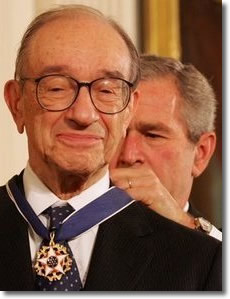 Money
Money